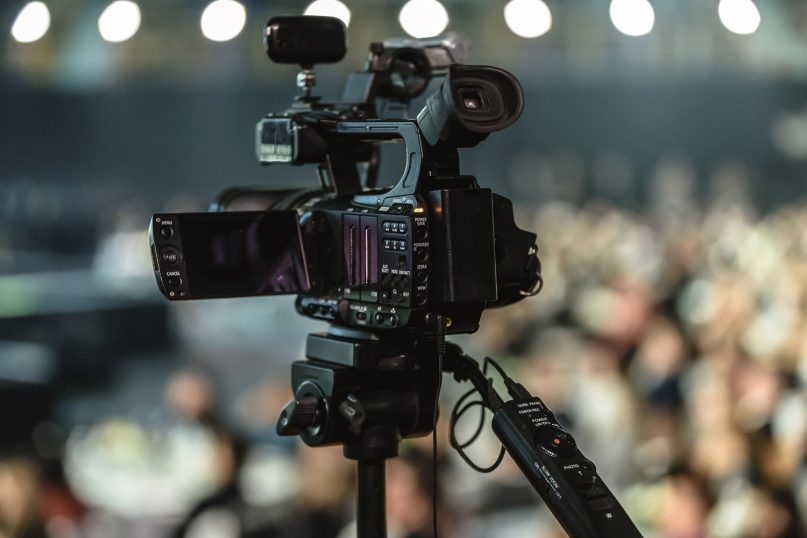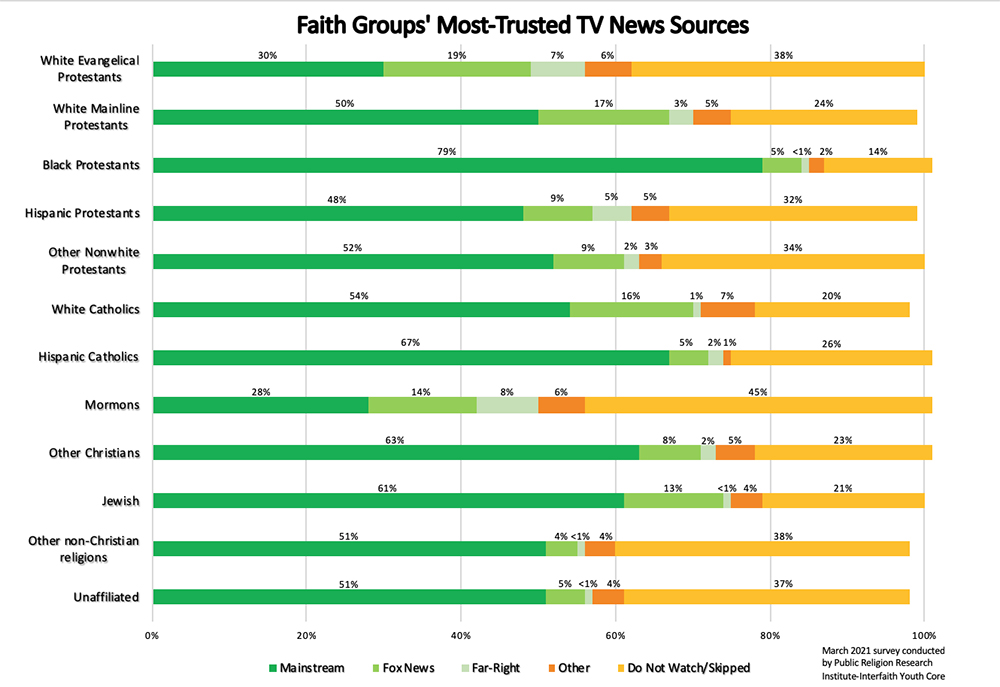(RNS) — American media isn’t just dividing people politically — it’s dividing people religiously, too.
That’s according to data provided to Religion News Service this week by the Public Religion Research Institute, pulled from a larger survey the group conducted in March, which examined the news-watching habits of Americans from across the religious spectrum.
Most faith communities express majority support for mainstream news outlets — which PRRI classifies as a combination of CNN, MSNBC, broadcast networks (NBC, ABC or CBS), local news and public television — as their trusted news source. Black Protestants in particular overwhelmingly (79%) said they looked to mainstream news outlets to provide accurate information about politics and current events, the largest by a significant margin. They are followed by Hispanic Catholics (67%), other Christians (63%), Jewish Americans (61%), white Catholics (54%), other non-Christians (51%), the religiously unaffiliated (51%) and White mainline Protestants (50%).
But there are notable exceptions: White evangelicals (30%) and members of the Church of Jesus Christ of Latter-day Saints (28%) are the least likely to trust mainstream news.
White evangelical Protestants are the most likely to say they trust Fox News, with 19% saying the station is their go-to for accurate information. Close behind are white mainline Protestants (17%), white Catholics (16%), members of the Church of Jesus Christ of Latter-day Saints (14%) and Jews (13%). By contrast, only 5% of Black Protestants and religiously unaffiliated Americans, respectively, trust Fox.
As for far-right news outlets that include One America News Network and Newsmax, members of the Church of Jesus Christ of Latter-day Saints (8%) and white evangelicals (7%) are the most likely to say they trust such sources the most. They are followed by Hispanic Protestants (5%) and even smaller percentages of white mainliners (3%), other nonwhite Protestants (2%) and Hispanic Catholics (2%). One percent or less of white Catholics, Black Protestants, Jews or religiously unaffiliated Americans said they trusted far-right news sources.
Yet despite the variety of American media options, significant numbers of several religious groups said they didn’t watch television news at all. For example, 44% of members of the Church of Jesus Christ of Latter-day Saints reported they do not tune in to television news; 37% of white evangelicals, 37% of religiously unaffiliated Americans and 37% of those belonging to other non-Christian traditions said the same. Black Protestants are the least likely to say they didn’t get their news from television, at only 13%.
Natalie Jackson, PRRI’s director of research, called the category a “wild card,” explaining the group appears to represent several different sub-groups at once.
“Some of it is not trusting news, but some of it is ‘this is not a part of my daily life,’ or ‘I use online news,’” Jackson said.
The difference between the groups may reflect existing political alignments. For example, the same survey found white evangelicals, which skew heavily Republican, are the most likely (66%) to say they believe the 2020 election was stolen from Donald Trump. Only members of the Church of Jesus Christ of Latter-day Saints — who also skew Republican — came close, with 46% saying the same.
By contrast, Black Protestants, who skew heavily Democratic, were the least likely to say the election was stolen, with only 6% agreeing with that statement.
But in their initial analysis, PRRI noted that even among Republicans, media consumption appears to make a difference: Republicans who mostly look to mainstream outlets are far less likely to say they believe the 2020 election was stolen from Donald Trump than Republicans who trust Fox News or far-right outlets — networks that have hosted voices who repeated widely discredited claims about the presidential contest.
Jackson said the rift is evidence of an emerging “media hierarchy” among Republicans, one of several larger media trends and cultural divides that extend to faith communities as well.






